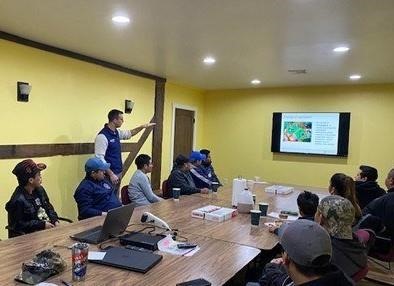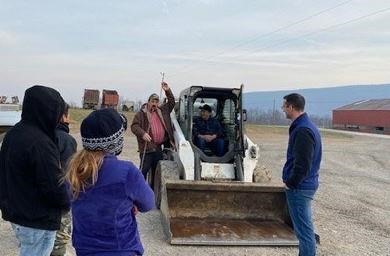Farm safety is a topic that invariably comes up during discussions with groups of farmers. It's a topic for which almost everyone has a story to share, whether through a personal experience or by an experience of someone they know. A retrospective survey was conducted with dairy discussion group participants in Ireland (O’Connor et al., 2020). Personal experiences were shared in discussions by 88% of the responding groups, while 82% reiterated close calls. There is tremendous value in discussing occupational safety and health, even with groups meeting primarily to exchange information on production practices.

Employees at a dairy farm gather to attend a training session on farm safety presented by Dr. Adrian Barragan. Photo Credit Ginger Fenton
Another agricultural group is the cooperative or co-op which allows farmers to come together to realize economic, social, or other benefits through working collectively. The possibility of utilizing co-ops to share community resources for the purpose of promoting mental health, another important aspect of farm health and well-being, was studied by Liang et al. (2021). The community provided by co-ops was recognized as a valuable avenue to convey resources with a sense of belonging and control for the members.
The nature of farm work frequently requires independence, which is one of the aspects that many farmers value and appreciate. Does that independent work limit the positive influence of coworkers or peers? How about the nutritionists, veterinarians, lenders, extension educators, and other industry professionals providing services that can be viewed as trusted, convenient sources of information?
Researchers in Wisconsin sought to evaluate the influence of certain industry professionals on decisions related to safety made by their clients (Bendixsen et al., 2017). Study participants, including dairy farmers, insurance agents, and bankers, indicated confidence that insurance agents could play a role in designing farm safety programs that aid in identifying hazards and providing interventions, due to their familiarity with the various risks and potential problems.

John Tyson, Extension Ag Engineer, discusses skid loader safety at a dairy farm. Photo Credit Ginger Fenton
Other professionals who visit farms often provide production and management information for farms. They could easily relay farm safety information as well. Dairy farmers were reported to value publications and face-to-face meetings as important communication methods, while on-farm consultants were viewed as safety influencers (Wilmes and Swenson, 2019). Expect safety messages to continue to be relayed by professionals visiting farms, as well as incorporated into meetings and woven into publications.
Following a series of interviews with farmers, farmwives and other family members, researchers concluded that farmers realize the risks that are part of farm work (Sorensen et al., 2017). Further, they reported that farmers believe their perseverance and resourcefulness are key characteristics that allow them to survive, not necessarily following safety practices.
A recent review of the literature of health and safety interventions in the dairy industry indicated that evidence assessing the effectiveness of these interventions is lacking (Driscoll et al., 2022). Even as researchers try to understand more about why choices regarding farm safety practices are made, we should not stop the conversation. Farmers and ag industry professionals can still work together to have a positive influence on others in the ag community by looking out for them, encouraging safe practices, and sharing information that promotes farm safety through discussion groups, at meetings and field days, and even in those informal settings like the local co-op or feed store.
Source : psu.edu